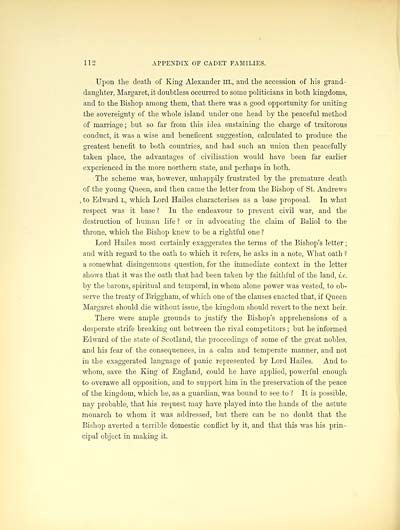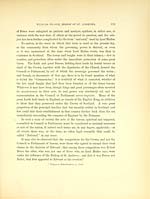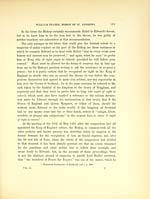Frasers of Philorth > Volume 2
(126)
Download files
Complete book:
Individual page:
Thumbnail gallery: Grid view | List view

112 APPENDIX OF CADET FAMILIES.
Upon the death of King Alexander in., and the accession of his grand-
daughter, Margaret, it doubtless occurred to some politicians in both kingdoms,
and to the Bishop among them, that there was a good opportunity for uniting
the sovereignty of the whole island under one head by the peaceful method
of marriage ; but so far from this idea sustaining the charge of traitorous
conduct, it was a wise and beneficent suggestion, calculated to produce the
greatest benefit to both countries, and had such an union then peacefully
taken place, the advantages of civilisation would have been far earlier
experienced in the more northern state, and perhaps in both.
The scheme was, however, unhappily frustrated by the premature death
of the young Queen, and then came the letter from the Bishop of St. Andrews
.to Edward I., which Lord Hailes characterises as a base proposal. In what
respect was it base? In the endeavour to prevent civil war, and the
destruction of human life ? or in advocating the claim of Baliol to the
throne, which the Bishop knew to be a rightful one ?
Lord Hailes most certainly exaggerates the terms of the Bishop's letter ;
and with regard to the oath to which it refers, he asks in a note, What oath ?
a somewhat disingenuous question, for the immediate context in the letter
shows that it was the oath that had been taken by the faithful of the land, i.e.
by the barons, spiritual and temporal, in whom alone power was vested, to ob-
serve the treaty of Briggham, of which one of the clauses enacted that, if Queen
Margaret should die without issue, the kingdom should revert to the next heir.
There were ample grounds to justify the Bishop's apprehensions of a
desperate strife breaking out between the rival competitors ; but he informed
Edward of the state of Scotland, the proceedings of some of the great nobles,
and his fear of the consequences, in a calm and temperate manner, and not
in the exaggerated language of panic represented by Lord Hailes. And to
whom, save the King of England, could he have applied, powerful enough
to overawe all opposition, and to support him in the preservation of the peace
of the kingdom, which he, as a guardian, was bound to see to ? It is possible,
nay probable, that his request may have played into the hands of the astute
monarch to whom it was addressed, but there can be no doubt that the
Bishop averted a terrible domestic conflict by it, and that this was his prin-
cipal object in making it.
Upon the death of King Alexander in., and the accession of his grand-
daughter, Margaret, it doubtless occurred to some politicians in both kingdoms,
and to the Bishop among them, that there was a good opportunity for uniting
the sovereignty of the whole island under one head by the peaceful method
of marriage ; but so far from this idea sustaining the charge of traitorous
conduct, it was a wise and beneficent suggestion, calculated to produce the
greatest benefit to both countries, and had such an union then peacefully
taken place, the advantages of civilisation would have been far earlier
experienced in the more northern state, and perhaps in both.
The scheme was, however, unhappily frustrated by the premature death
of the young Queen, and then came the letter from the Bishop of St. Andrews
.to Edward I., which Lord Hailes characterises as a base proposal. In what
respect was it base? In the endeavour to prevent civil war, and the
destruction of human life ? or in advocating the claim of Baliol to the
throne, which the Bishop knew to be a rightful one ?
Lord Hailes most certainly exaggerates the terms of the Bishop's letter ;
and with regard to the oath to which it refers, he asks in a note, What oath ?
a somewhat disingenuous question, for the immediate context in the letter
shows that it was the oath that had been taken by the faithful of the land, i.e.
by the barons, spiritual and temporal, in whom alone power was vested, to ob-
serve the treaty of Briggham, of which one of the clauses enacted that, if Queen
Margaret should die without issue, the kingdom should revert to the next heir.
There were ample grounds to justify the Bishop's apprehensions of a
desperate strife breaking out between the rival competitors ; but he informed
Edward of the state of Scotland, the proceedings of some of the great nobles,
and his fear of the consequences, in a calm and temperate manner, and not
in the exaggerated language of panic represented by Lord Hailes. And to
whom, save the King of England, could he have applied, powerful enough
to overawe all opposition, and to support him in the preservation of the peace
of the kingdom, which he, as a guardian, was bound to see to ? It is possible,
nay probable, that his request may have played into the hands of the astute
monarch to whom it was addressed, but there can be no doubt that the
Bishop averted a terrible domestic conflict by it, and that this was his prin-
cipal object in making it.
Set display mode to:
![]() Universal Viewer |
Universal Viewer | ![]() Mirador |
Large image | Transcription
Mirador |
Large image | Transcription
Images and transcriptions on this page, including medium image downloads, may be used under the Creative Commons Attribution 4.0 International Licence unless otherwise stated. ![]()
| Histories of Scottish families > Frasers of Philorth > Volume 2 > (126) |
|---|
| Permanent URL | https://digital.nls.uk/96571768 |
|---|
| Attribution and copyright: |
|
|---|---|
| Description | A selection of almost 400 printed items relating to the history of Scottish families, mostly dating from the 19th and early 20th centuries. Includes memoirs, genealogies and clan histories, with a few produced by emigrant families. The earliest family history goes back to AD 916. |
|---|

